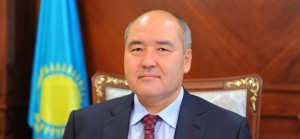ASTANA – Kazakhstan’s Samruk Kazyna Sovereign Wealth Fund will redistribute responsibilities within the fund and change its portfolio structure and approach to investment as part of its recently announced transformation, Chairman of the Board of Samruk Kazyna Umirzak Shukeyev recently told The Astana Times in an exclusive interview. This will require internal changes, including training and incorporating foreign expertise, as well as legislative changes in Kazakhstan.
Samruk Kazyna officially unveiled its transformation programme, which is intended to help modernise Kazakhstan’s economy and bring an additional $11 billion to the country’s gross domestic product by 2020, on Oct. 6. The privatisation of assets as part of the transformation has put shares in 106 companies worth $9 billion up for sale, including some shares in strategic assets. Fourteen companies are currently up for sale completely.
Foreign buyers will be able to purchase shares in strategic assets through special procedures stipulated in Kazakhstan’s legislation, including getting permission from the country’s Strategic Assets Commission, Shukeyev said. “There might also be some legal restrictions in terms of ensuring national security interests,” he said.
One company designed as a strategic asset, the Transtelecom Joint Stock Company, is to be privatised, with 49 percent of its shares to be sold as a single lot.
“Four national companies, including KEGOC (the Kazakhstan Electric Grid Operating Company), Kazakhstan Temir Zholy, Kazatomprom and Samruk-Energy, will come into the stock market in the framework of the People’s IPO programme. In addition, we are going to attract strategic investors to the Kazakhstan Engineering Company, 49 percent of the shares of which will be put up for sale as well,” he said.
Only three months from the first sale, it is premature to speak about the success of the newly-private companies, Shukeyev said. However, the fund intends to provide monitoring tools for each contract. “But this will only apply to those assets that will be implemented under the terms of maintaining the profile of the company or the preservation of jobs for a certain time after the sale of the asset,” he explained.
With the income from the sales, the fund intends to invest in innovative companies and technologies. “We put special emphasis on the development of start-up companies in energy, mining, petrochemical, real estate and development businesses,” Shukeyev said.
Among the coming changes to the fund itself will be a stronger board of directors, including international experts. “The fund needs to strengthen its board of directors, involving international experts and providing them with full decision-making power. The fund also needs to significantly optimise interaction with government bodies, shifting the focus from statistical reporting to business activity. This will, in turn, require some improvements in Kazakhstan’s business legislation, as well as review of tariff regulation and minimising the number of queries that are not associated with an increase in profits,” he said.
The activities of fund personnel are also going to be reoriented away from the government and toward private industry, he said.
“No less than 75 percent of time in the activity of industry-specific employees of successful peer funds is aimed at increasing the value of existing portfolio companies, finding and managing new projects, while the remaining part may include functions for interaction with public authorities and other tasks. In Samruk Kazyna at the moment, 60 percent of industry employees’ working time is devoted to building up relationships with government authorities. Therefore, in order to improve the quality of asset management, the fund needs to reorient industry-specific teams to work more to add value to existing portfolio companies and develop new projects. This will require advanced training of existing employees through holding additional training and seminars with a preliminary evaluation of their level of knowledge, as well as hiring new, highly skilled professionals with international working experience.”
International best practices are the base of the transformation process, Shukeyev said. “The fund’s transformation process started with the study of international experience and comparative analysis. Among the success stories of transformation are the sovereign wealth funds Mubadala, Khazanah, Temasek, as well as the Sberbank, La Poste and Statoil companies.”
In the case of Singapore’s Temasek Holding, a transformation that included more professional management and restructuring of its portfolio led to an increase in profit over less than a decade. Until 2002, the holding largely served as a fiduciary with little value for companies in the portfolio, Shukeyev said, but beginning in 2002, the holding began to form a professional board of directors and management team and significantly restructure its conglomerates.
“Temasek approved the ‘Yellow Pages rule’ to prevent interference in the private sector, which implied the fund did not invest in businesses if the goods and services had already been provided by companies that could be found in the telephone directory. Since 2004, Temasek has been actively committed to building a professional investment holding company that would work in emerging markets, with more than 14 industry clusters and global geographic coverage,” Shukeyev said, adding that the holding began investing actively around the world; now, 69 percent of the company’s assets are overseas. “From 2005 to 2010 the total income of shareholders increased from 16 percent to 43 percent, while the value of the portfolio increased from $54 billion to $170 billion.”
Transformations like those are informing Samruk Kazyna’s shift, and its transformation programme is hoped to have a major impact. “Even minor optimisation of operating expenses by 2 percent will save 90 billion tenge (US$49.75 million) in the Samruk Kazyna group of companies, while the fund is setting more ambitious goals,” the chairman of the board said.


